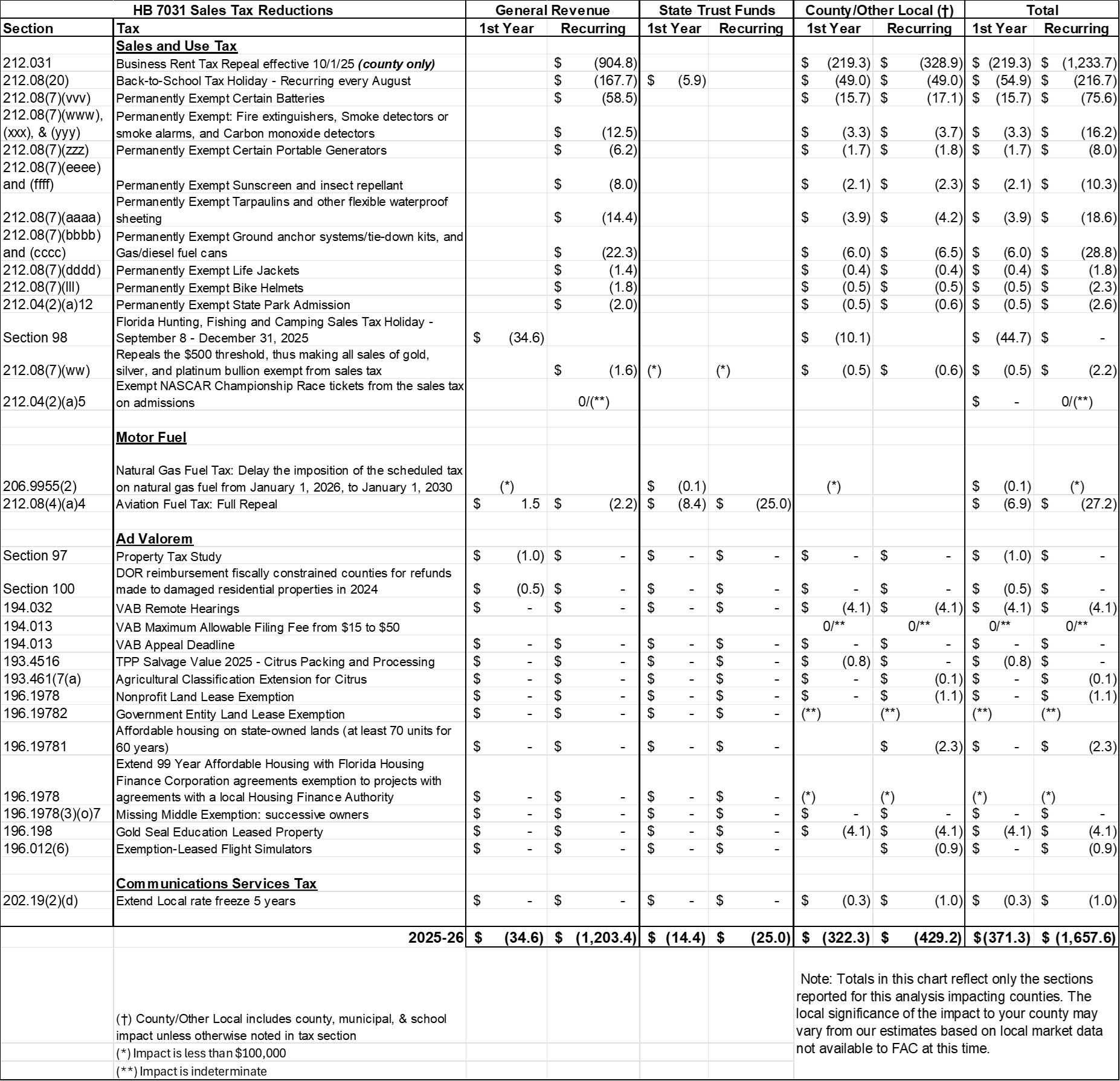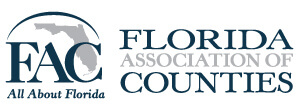
On Monday, June 16, the Florida House of Representatives and the Florida Senate agreed to the budget for the State Fiscal Year (SFY) 2025–26. The budget is the culmination of many rounds of budget negotiations throughout the legislative session. The Florida Legislature is constitutionally required to pass a state budget, officially titled the General Appropriations Act during the annual regular session. This year, the Legislature extended the legislative session twice in order to reach a budget and taxation agreement. This led to a lengthy interim period following the traditional 60-day session, ultimately concluding on the 105th day and adjourning Sine Die.
The SFY 2025-26 General Appropriations Act totals approximately $115 billion and represents a 1.98% decrease from the previous SFY 2024 General Appropriations Act. However, the budget is subject to potential line-item vetoes by the governor.
The chart below summarizes a comparison of this year’s SFY 2025-26 budget, and the budget approved from SFY 2024–25.
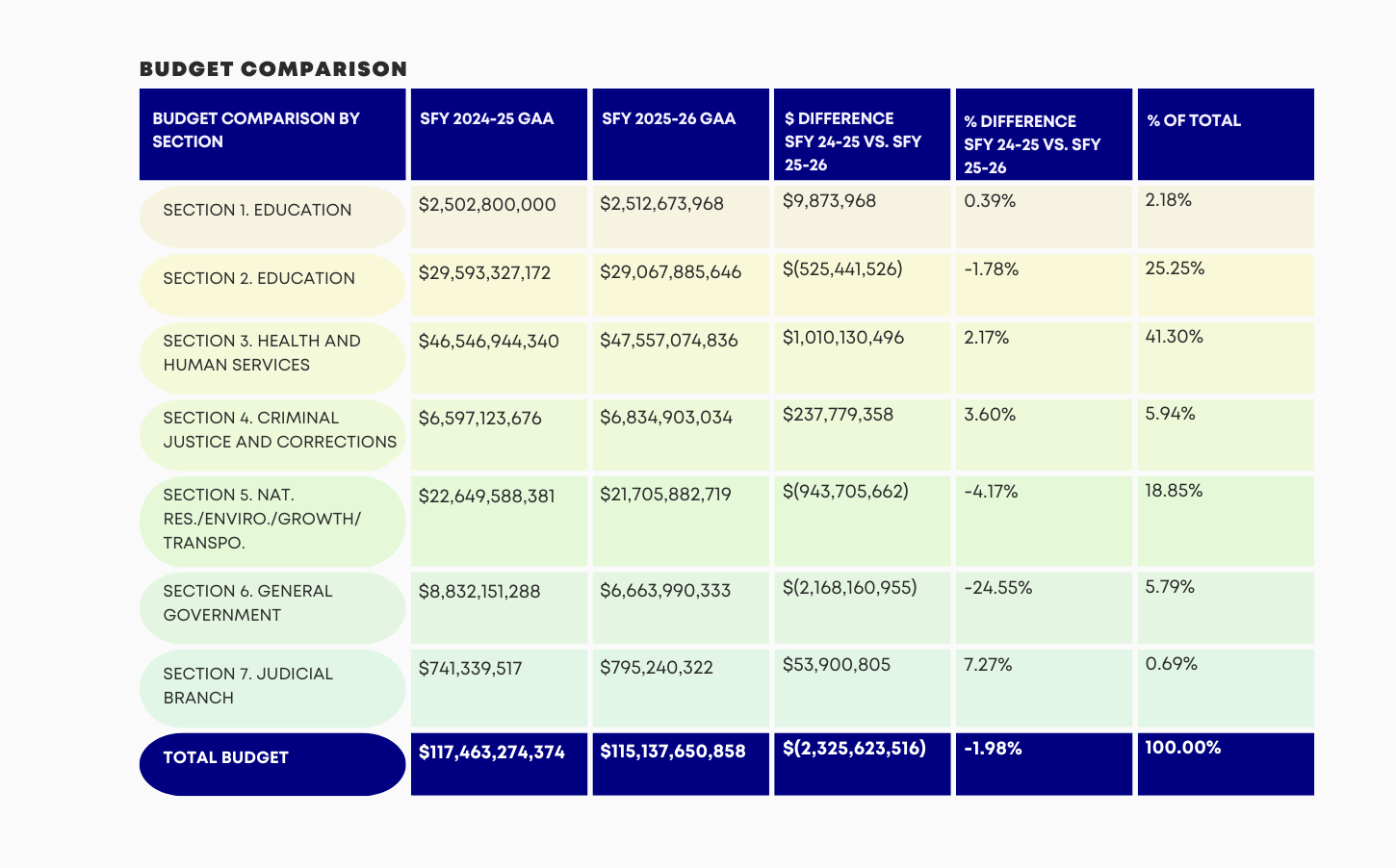
Health and Human Services received the largest portion of funding for the budget in SFY 2025-26, totaling approximately $47.6 billion. This represents a 2.17% increase in appropriation from the current year. All educational programs and services combined received the second-largest amount of funding, totaling approximately $31.6 billion. This represents a decrease of approximately 1.61% from the current fiscal year.
Finally, Natural Resources, Environmental Issues, Growth Management and Transportation Expenditures represent the third largest portion of the budget in SFY 2025-26 with funding equaling approximately $21.7 billion, a decrease of 4.17%.
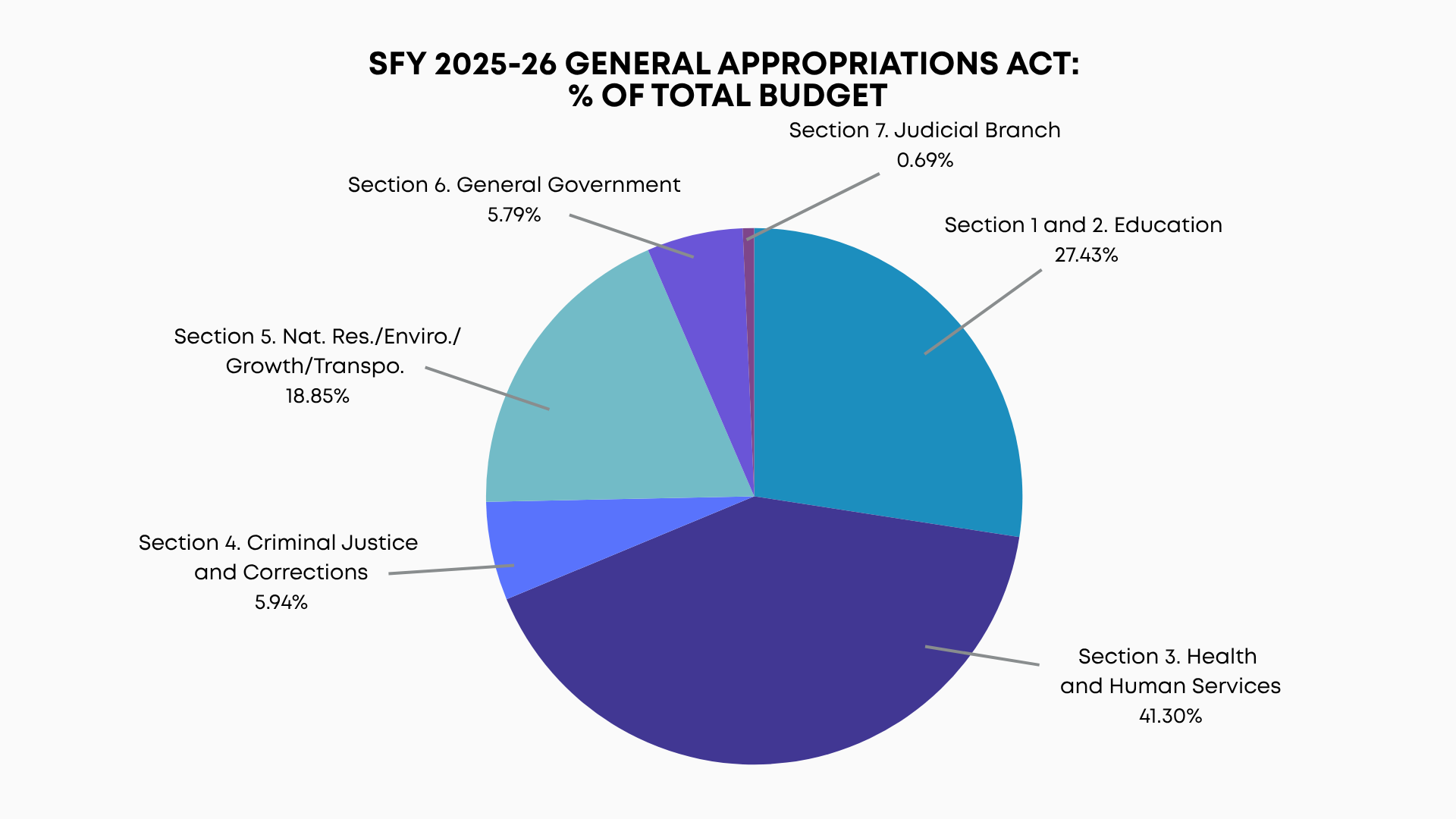
General Revenue expenditures for the SFY 2025-26 budget equal approximately $50.6 billion, while trust fund expenditures total approximately $64.6 billion. The chart below compares expenditures between the SFY 2025-26 budget and the previous year’s budget for SFY 2024-25 by fund type.
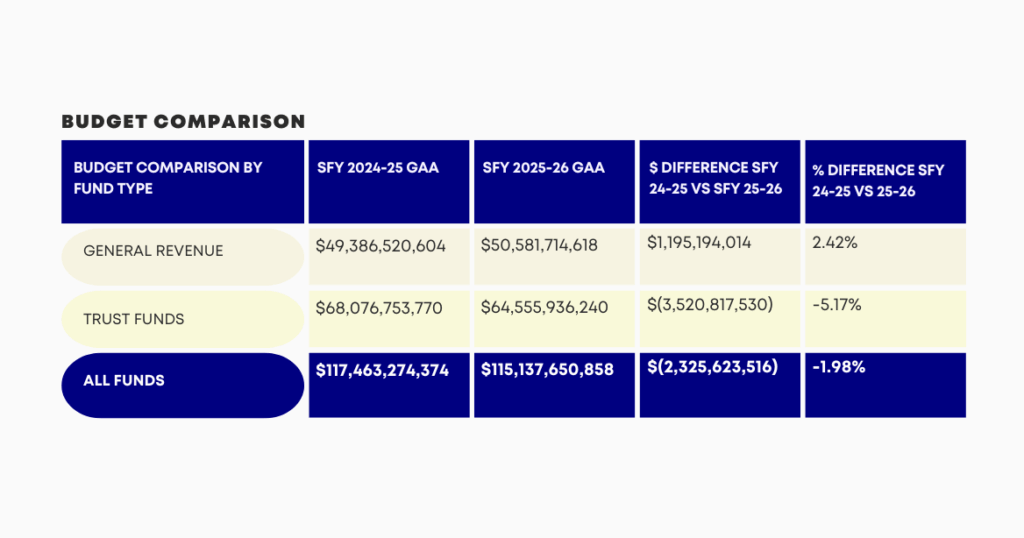
COUNTY FUNDING HIGHLIGHTS
HEALTH AND HUMAN SERVICES
Shared County/State Juvenile Detention: The SFY 2025-26 budget estimates the counties’ portion of total Shared County/State Juvenile Detention to be $78,245,654. This represents an estimated increase of $4,624,006 from the current year’s budget, or approximately 6.28%.
Community Substance Abuse and Mental Health Services: Funded at approximately $1.4 billion in the budget.
911 and E911 Grants: The SFY 2025-26 budget distributes $121.8 million for local 911 telephone systems and $15.6 million for local non-wireless E911 projects.
Community Action Treatment (CAT) Teams: The SFY 2025-26 budget allocates $41.5 million, directed to DCF to contract with providers throughout the state for the operation of CAT teams, which provide community-based services for children (aged 11 to 21) with mental health and/or substance abuse diagnoses, this is the same budget as the previous fiscal year.
Public Safety, Mental Health, and Substance Abuse Local Matching Grant Program: The SFY 2025-26 budget allocates $15 million for the program, which supports county programs that serve adults or youth who are in behavioral crisis and at risk of entering the criminal justice system. This represents a 66.6 % increase from last year’s budget.
Crime Labs: The SFY 2025-26 budget allocates slightly over $82 million in grants and aid to local governments for criminal investigations, which represents an 6.83% increase over the previous fiscal year.
Homeless Programs Challenge Grants: The SFY 2025-26 budget allocates approximately $20 million, to DCF for challenge grants. The continuums of care that receive challenge grants pursuant to section 420.6225(4), Florida Statutes, must prioritize mental health and substance abuse treatment, short-term and transitional shelters, sanctioned camping sites and safe parking sites. Sanctioned camping sites must provide sanitation and security at the site. Continuums of care receiving challenge grants shall provide quarterly reports to the State Office on Homelessness detailing the quantity, capacity, sanitation, security, services offered, and costs for sanctioned camping sites and safe parking sites. This additional funding represents a decrease from previous budget years.
Local Jail Grants – Immigration Enforcement: $3 million is provided to the Department of Law Enforcement to award grants to local jails that have contracted with the United States Immigration and Customs Enforcement to support immigration enforcement efforts.
AGRICULTURAL & ENVIRONMENT
Water Quality Highlights:
- Septic-to-Sewer Improvements: The SFY 2025-26 budget appropriates $461 million toward the wastewater grant program for projects to construct, upgrade or expand wastewater facilities, to provide advanced wastewater treatment and to convert from septic to sewer, as established in section 403.0673, F.S.
- Water Quality Improvement Grant Program: As part of the $505 million appropriated under the Wastewater Grant program, $200 million is authorized for water quality improvement grants. At least 25% of annual funding must be dedicated for projects within a Rural Area of Opportunity, as newly established in SB 2506.
- Water Quality Enhancement and Accountability: The budget allocates $10.8 million for increased water quality monitoring, maintenance and enhancement of a water quality public information portal, and for the continued support of the Blue-Green Algae Task Force. Funds may be used for administration and planning costs. The task force will support key funding and restoration initiatives to expedite nutrient reduction in Lake Okeechobee and the St. Lucie and Caloosahatchee estuaries. The task force will identify priority projects for funding that are based on scientific data and build upon Basin Management Action Plans (BMAPs) to provide the largest and most meaningful nutrient reductions in key waterbodies, can inform policy and framework changes as well as make recommendations for regulatory changes.
- Small County Wastewater Grants: $8 million was allocated for additional wastewater treatment activities in eligible small counties
- Total Maximum Daily Loads: The SFY 2025-26 budget allocates $25 million for Total Maximum Daily Load (TMDL) enforcement. The department may also provide cost-share funding for innovative nutrient removal projects under this funding.
- Harmful Algal Blooms: The SFY 2025-26 budget allocates $25 million for programs addressing harmful algal blooms. $10 million of this is provided to the Department of Environmental Protection to procure long-term water quality treatment concepts, design and pilot projects that sequester or remove legacy nutrients in Lake Okeechobee, to combat harmful algal blooms. An additional $5 million is allocated to assist county responses to emergency conditions associated with Harmful Algal Blooms (HABs) (which includes, but is not limited to, red tide and blue-green algae blooms) that may impact the public health, Florida’s environment and fragile ecosystems, including beaches and wildlife. Funds will implement an emergency grant program for the mitigation of HABs to minimize the impacts to Florida residents and visitors.
- Springs Restoration: The SFY 2025-26 budget allocates $50 million for land acquisition to protect springs and for capital projects that protect the quality and quantity of water that flows from springs.
- Drinking Water and Wastewater Emerging Contaminants: The SFY 2025-26 budget allocated $25.6 million and $7.2 million, respectively, for monitoring emerging contaminants in drinking water and wastewater.
- Alternative Water Supply: The SFY 2025-26 budget allocates $50 million to the water supply and water resource development grant program to help communities plan and implement conservation, reuse and other water supply and water resource development projects. The House includes language to provide priority funding to regional projects in the areas of greatest need and for projects that provide the greatest benefit. The department shall identify and research all viable alternative water supply resources and provide an assessment of funding needs critical to supporting Florida’s growing economy.
- Water Supply Grant Program: House and Senate leaders did not fund water supply grant programs in this year’s budget.
Florida Forever: $18 million was appropriated for land conservation through the Florida Forever program.
Resilient Florida Programs: The SFY 2025-26 budget allocates $150 million to the Department of Environmental Protection for project funding within the Statewide Flooding and Sea Level Rise Resilience Plan. In the event that projects included in the plan are unable to continue or if excess funds are identified by completed projects or ineligible activities proposed in applications, the department may reallocate funds to projects on its Statewide Flooding and Sea Level Rise Resilience Plan to the next project on the ranked list or to projects already funded in year one that have identified funding needs in subsequent years.
An additional $20 million is allocated for grants to fund preconstruction planning activities and vulnerability assessments.
Beach Management Funding Assistance Program: The SFY 2025-26 budget allocates $52.5 million provided to the Department of Environmental Protection for distribution to beach and inlet management projects consistent with any component of the comprehensive long-term management plan developed in accordance with section 161.161, Florida Statutes. Funds shall be used to fund post-construction monitoring and projects 1 through 13 on the Strategic Beach Management Plan and projects 1 through 8 on the Inlet Management Plan.
Florida Recreation Development Assistance Program (FRDAP): The FRDAP grant program did not receive funding in this year’s budget.
TRANSPORTATION AND ECONOMIC DEVELOPMENT
Affordable Housing:
- State Housing Initiatives Partnership (SHIP) program: The Legislature appropriated $163.8 million respectively, for the State Housing Initiatives Partnership (SHIP), as part of the affordable housing package signed into law.
- Affordable Housing Programs: $221.2 million was appropriated to The Florida Housing Finance Corporation for distribution.
- Hometown Heroes Housing Program: $150 million makes homeownership affordable for eligible frontline community workers such as law enforcement officers, firefighters, educators, healthcare professionals, childcare employees, and active military or veterans, as part of the affordable housing package signed into law.
Job Growth Grant Fund: The SFY 2025-26 budget allocates $50 million.
Visit Florida: The SFY 2025-26 budget allocates $80 million.
Small County Outreach Program (SCOP): The SFY 2025-26 budget allocates $91.9 million. Specifically, $9,000,000 is provided for transportation projects in municipalities pursuant to section 339.2818(7), F.S.
Small County Road Assistance Program (SCRAP): The SFY 2025-26 budget allocates $27.4 million.
Transportation:
Transportation Disadvantaged Grants: The SFY 2025-26 budget allocates approximately $62.35 million. Specifically, $6,000,000 is provided to the Transportation Disadvantaged Commission for a competitive grant program to provide innovative and efficient transportation service delivery. Funds shall be used to provide competitive grants to community transportation coordinators for innovative service delivery that is more cost efficient for the program and time efficient for the users. Grants may be or projects in which a community transportation coordinator works with a non-traditional service provider, such as a transportation network company or other entity that provides door-to-door, on-demand, or scheduled transportation services. A county may submit one project that encompasses multiple goals or a single goal, such as providing cross-county mobility or reducing service gaps between existing routes and the user’s final destination. A county may not receive more than one award and may receive a maximum award of $750,000. Multiple counties may partner for a grant of up to $1,500,000 provided that the project includes a goal of providing regional mobility in addition to any other goals. A ten percent local match is required for all grants. All funds shall be used to provide direct services to transportation disadvantaged clients.
Rural Economic Development:
- Broadband: The SFY 2023-24 budget allocates $100 million for Florida’s Broadband Equity, Access, and Deployment program (BEAD), which funds broadband Internet planning, deployment, mapping, equity, and adoption activities with a goal of providing high-speed, reliable broadband Internet service access to all Florida communities.
- Rural Infrastructure Fund: The SFY 2025-26 budget allocates $22 million to support local rural infrastructure projects such as broadband, roads, storm and wastewater systems, and telecommunications facilities. Specifically, $5,000,000 is provided as grant funding for the following Florida panhandle counties to facilitate the planning, preparing, and financing of infrastructure projects in these rural communities: Calhoun, Gadsden, Holmes, Jackson, Liberty, and Washington Counties. Eligible uses of these funds include roads or other remedies to transportation impediments; stormwater systems; water or wastewater facilities; and telecommunications facilities and broadband facilities. Grant funds are provided pursuant to section 288.0655(7), Florida Statutes.
GENERAL GOVERNMENT
Library Grants and Library Cooperatives: The SFY 2025-26 budget allocates approximately $21.9 million.
Fiscally Constrained County Offset: The SFY 2025-26 budget allocates $73.8 million, to offset the impacts of previously approved constitutional amendments.
Emergency Distributions: The SFY 2025-26 budget allocates $35.2 million in emergency distributions revenue sharing for small counties from the Local Government Half-Cent Sales Tax Clearing Trust Fund.
Emergency Management: The SFY 2025-26 budget allocates approximately $4.6 million towards emergency preparedness and $6.3 million towards emergency preparedness planning and administration.
Cybersecurity: The SFY 2025-26 budget allocates $11,997,340 in nonrecurring funds from the Federal Grants Trust Fund to the Division of Emergency Management to administer the State and Local Cybersecurity Grant Program, as authorized by the federal Infrastructure Investment and Jobs Act (Public Law 117-58). Of these funds, up to $1,000,000 may be transferred to the Department of Management Services for the Florida Digital Service to procure a Governance, Risk, and Compliance platform. This appropriation is contingent upon the identification of sufficient state and local matching funds required to qualify for the federal program. The Division of Emergency Management and the Department of Management Services are directed to collaborate in certifying qualifying expenditures of state general revenue funds that meet the federal match requirements.
The SFY 2025-26 budget also allocates $15,000,000 in nonrecurring funds from the General Revenue fund to the Department of Management Services to administer a competitive grant program that provides nonrecurring technical assistance to local governments for the development and enhancement of cybersecurity risk management programs.
Back of the Bill
Section 171, Petroleum Cleanup: Appropriates $195 million for SFY 2024-25 to the Department of Environmental Protection for the petroleum tank cleanup program.
Section 172, Piney Point: $25,000,000 nonrecurring is appropriated to the Department of Environmental Protection for Fiscal Year 2024-2025 to continue the closure of the Piney Point Facility, now operated as the Eastport Terminal facility, located in Manatee County, Florida. These funds may be used to address environmental impacts either directly or indirectly related to the emergency response and site closure.
Section 173 & 174, Wildlife Corridor Reversion: $200 million from the 2024 GAA is reverted to General Revenue and subsequently appropriated for SFY 2025-26 to purchase the following lands for conservation:
- Lands partially or wholly within Okaloosa County that will provide public access and are within the Gulf Island National Seashore or located next to an existing local government park
- Lands within the Caloosahatchee Big Cypress Land Acquisition Project, in whole or in part
- Lands partially or wholly within the Ocala to Osceola (020) Wildlife Corridor within Alachua, Baker, Bradford, Clay, Columbia, Duval, Hamilton, Lake, Marion, Putnam, Union and Volusia counties or within a Florida Forever project boundary in Flagler, St. Johns or Nassau counties. Lands purchased under this subsection must be within or connected to the 020 Wildlife Corridor and identified on a current Florida Forever Priority List approved by the Board of Trustees of the Internal Improvement Trust Fund
Section 240, Fiscally Constrained County Hurricane match for HMAP: Continuation of DEM appropriation for required match of local governments within fiscally constrained counties for Hazard Mitigation Assistance Program grants related to Hurricane Idalia, shall revert and is appropriated to the division for Fiscal Year 2025-2026 to provide the full amount of the required match of local governments within fiscally constrained counties or hospitals located in fiscally contained counties that meet the definition of eligible entity under 44 CFR s. 206.221(e) for Hazard Mitigation Assistance Program grants related to the Federal Emergency Management Agency disaster declaration Hurricane Idalia in calendar year 2023 or Hurricanes Debby, Helene, and Milton in calendar year 2024. Such local governments or eligible hospitals must enter into agreements with the division to have their portions of the match requirements waived.
IMPLEMENTING & CONFORMING BILLS
Appropriations, Implementing, and Conforming bills make certain changes to substantive law in order to implement the proposed General Appropriations Act. Implementing and Conforming Bill topics include:
SB 2502 – Implementing the General Appropriations Act
Section 44, County Medicaid Cost share: Provides that local specially assessed funds used for direct payment program (DPP) payments made to hospitals serving Medicaid enrollees are not counted toward the state Medicaid expenditures. The implementing bill extends for another year the expiration of the language providing a cost savings to counties.
Section 50, DJJ Oversight: The Department of Juvenile Justice (DJJ) shall review county juvenile detention payments to ensure that counties fulfill their financial responsibilities required in s. 985.6865, Florida Statutes. If DJJ determines that a county has not met its obligations, the department shall direct the Department of Revenue to deduct the amount owed to the DJJ from the funds provided to the county under s. 218.23, Florida Statutes. The Department of Revenue shall transfer the funds withheld to the Shared County/State Juvenile Detention Trust Fund.
Section 55, Drone Replacement Program: Renames the drone replacement grant program to the drone replacement program. Modifies eligibility requirements for the program and prioritizes applicants located in rural counties and who have not received prior funding
Section 73, My Safe Florida Home Program: Modifies the My Safe Florida Home Program to low- or moderate-income people as defined in s. 420.0004. Hurricane mitigation inspections must have occurred within the previous 24 months from the date of application
Section 84, PFAS Standards: Extends the deadline for DEP to adopt by rule statewide cleanup target levels for PFAS in drinking water, groundwater and soil in order for US EPA to finalize its standards.
Section 86 & 87, Petroleum Cleanup: Exempts deductibles, copays, and monetary caps related to the Florida Petroleum Cleanup program under s. 376.3071, F.S. and the Florida Petroleum Liability and Restoration program under 376.3072, F.S., respectively.
Section 91, Working Waterfronts: Expands the working waterfronts program under Florida Forever to include marine aquaculture industries.
Section 93, Sand Replacement: Extends the deadline for large scale sand replacement projects under the Hurricane Restoration Reimbursement Grant Program from 2025 to 2026.
Section 94, Derelict Vessels: Allows FWC to use funds appropriated for the derelict vessel removal program for grants to local governments or to or to remove, store, destroy, and dispose of, or to pay private contractors to remove, store, destroy, and dispose of, derelict vessels or vessels declared a public nuisance pursuant to s. 327.73(1)(aa), Florida Statutes.
Section 107, Florida Hometown Hero Program: Modifies the Florida Hometown Hero Program eligibility to a person employed full-time by a Florida-based employer as a health care worker, school staff member, first responder, public safety or court employee, or child care worker; a servicemember of the United States military or military reserves, the United State Coast Guard or its reserves, or the Florida National Guard; or A veteran employed full-time by a Florida-based employer.
Section 124, DOGE: Section 124 of the 2025–2026 General Appropriations Act authorizes the Governor’s Office of Policy and Budget (OPB) to initiate a broad oversight review of local governments. The provision grants the OPB discretionary authority to evaluate local government functions, policies, and expenditures for the fiscal years ending September 30, 2024, and September 30, 2025.
The OPB “may” review any local governmental entity, local governing authority, or unit of local general-purpose government, as defined in section 218.31, Florida Statutes. The review may include—but is not limited to—expenditures, administrative practices, personnel standards, and records related to:
- Personnel costs, contracts, grants, and outsourcing;
- Financial documents such as audits, budgets, millage reports, and compliance assessments;
- Policies regarding employee training, responsibilities, and expectations.
The OPB may conduct these reviews to identify the following:
- Any use of resources supporting diversity, equity, and inclusion (DEI) initiatives that are inconsistent with state law.
- Evidence of gross overspending, waste, fraud, abuse, or mismanagement.
- Redundant or duplicative governmental functions.
Any local government that has received state funding during the current or prior fiscal year is required to provide the OPB, within 7 business days of a request, access to:
- Relevant personnel and subject matter experts;
- Physical premises (with consideration for security);
- Data systems and related information (with consideration for security).
Failure to comply may result in a fine of $1,000 per day. Fines must be recommended by OPB and approved by a three-fourths vote of the Administration Commission. These fines are enforced against the local government itself—not individual employees—and deposited into the General Revenue Fund.
Any OPB request for documents is deemed a public records request under Florida law, and enforcement will be governed by sections 119.11 and 119.12, Florida Statutes.
The OPB must compile and submit an initial report by January 13, 2026, to the Governor, Chief Financial Officer, Senate President, and House Speaker. The report must include:
- A list of local governments reviewed;
- Summaries of each review;
- Documentation of DEI-related expenditures inconsistent with law;
- Findings of waste, fraud, or mismanagement;
- Identification of redundant functions;
- Recommendations to improve governance, fiscal responsibility, and efficiency.
Additionally, the OPB must provide any relevant findings on potential misuse of resources to the Legislative Auditing Committee.
This oversight authority and reporting mandate will expire on July 1, 2026.
Section 126, Agriculture BMPs: Agricultural producers who implement best management practices adopted in s. 403.067(7)(c)2. shall be presumed to be in compliance with the recovery or prevention strategy.
CONFORMING BILLS
SB 7022 Florida Retirement System
The bill sets employer normal contribution rates and unfunded actuarial liability rates for the FRS. These rates are adjusted annually based on actuarial valuation, with the bill declaring fulfillment of an important state interest.
The aggregate employer contributions anticipated to be paid into the Florida Retirement System Trust Fund in Fiscal Year 2025-2026 will increase by approximately $310.2 million when compared to employer contributions that would be due based on the current statutory contribution rates. For counties, the increase is roughly $149.3 million.
Normal employer contribution rates for each membership class of Florida Retirement System (For both the Defined Benefit and Defined Investment plans) are amended as follows:
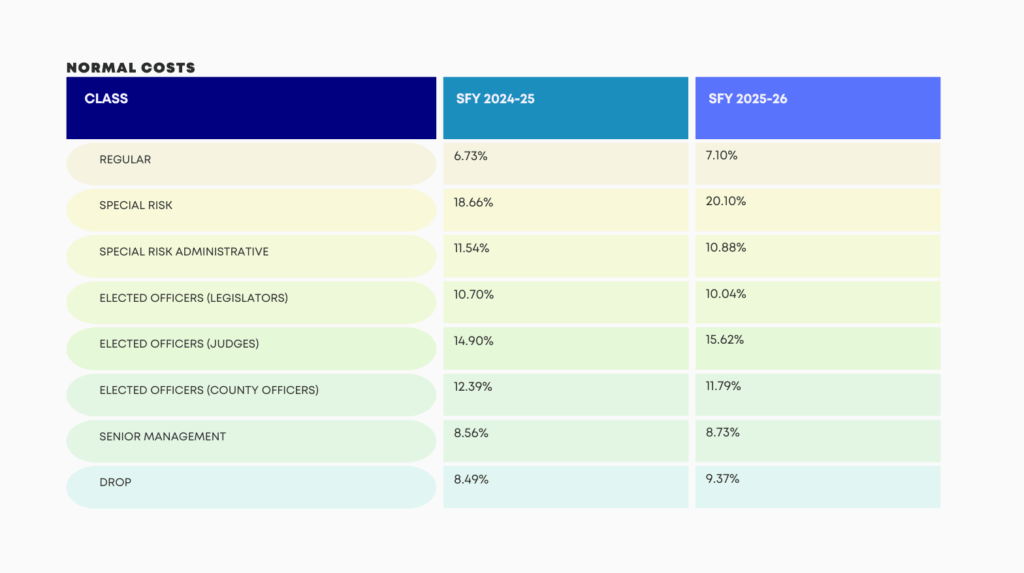
To address the unfunded actuarial liabilities (UAL) of the Florida Retirement System, the bill amends the current contribution rates for each membership class as follows:
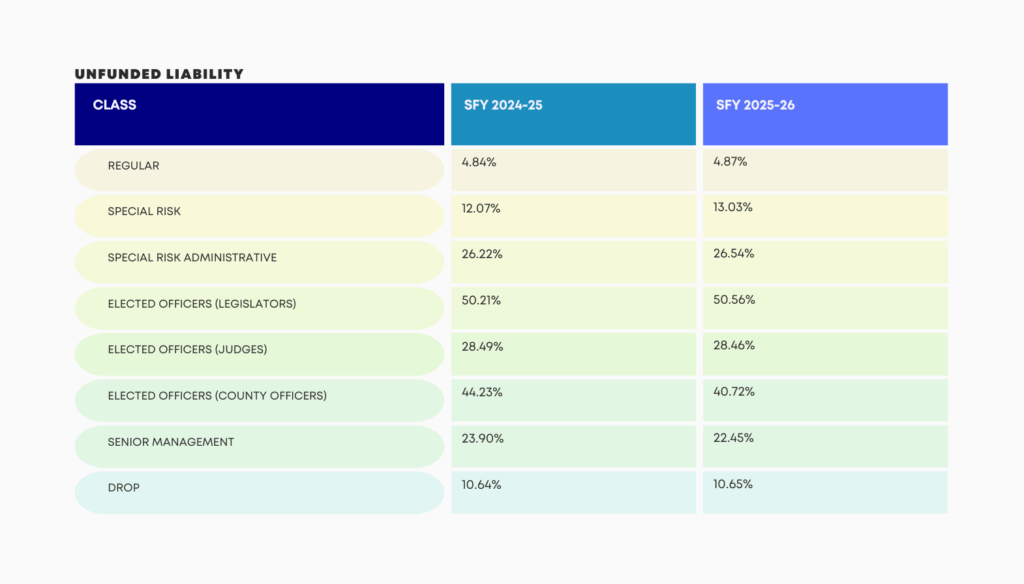
SB 2506 – Natural Resources
- Repeals s. 380.095, F.S., relating to the distribution of gaming compact revenues for land and water management purposes.
- Repeals s. 260.0145, F.S., the Local Trail Management Grant Program
- Provides a legislative declaration that acquiring land for water storage north of Lake Okeechobee is in the public interest, for a public purpose, and necessary for the public health and welfare and further provides that any acquisition of real property for a reservoir project constitutes a public purpose for which it is in the public interest to expend public funds. The amendment directs that any land necessary for implementing a reservoir project may only be acquired in accordance with law relating to acquisition of real property by a district and laws relating to eminent domain.
- Amends s. 380.093, F.S., to require as a Tier 1 criteria within the scoring system used by the Department of Environmental Protection (DEP) to rank projects in the Statewide Flooding and Sea Level Rise Resilience plan the degree to which the project reduces the flood risk and, thereby, increases credits awards to a community participating in the National Flood Insurance Program’s Community Rating System.
- Amends s. 403.0673, F.S., to require 25% of Water Quality Improvement Grant funding be used for projects within a rural area of opportunity. The amendment further requires the DEP to announce grant awards by November 1 of each fiscal year.
Joint Resolution on Budget Stabilization Fund
During budget negotiations, legislative leadership agreed to a joint resolution to amend the Florida Constitution to raise the cap on the Budget Stabilization Fund (BSF). SJR 1908 raises the cap on the BSF from 10% to 25% and requires an annual payment of the lesser of $750 million or the amount required to increase the principal balance of BSF to an amount equal to 25% of general revenue collections by June 30th each fiscal year. If the principal balance of the BSF exceeds an amount equal to 15% of revenue collections, the legislature may withdraw funds for the purpose of funding on a nonrecurring basis a critical state need. For the full text of the joint resolution, click here.
Tax Package: HB 7031
During the last budget conference meeting, the House and Senate released a proposed list of tax exemptions to be included in HB 7031. The negotiated agreement includes $2.25 billion in state recurring revenue reductions. This includes the elimination of the business rent tax, permanent sales tax exemptions targeted toward Florida families, and debt reduction.
Legislative leadership failed to produce a single draft of the final tax package prior to the ultimate agreement between the chambers and released a “chart only” document on day 102 of the 60-day legislative session.
On property taxes, the governor’s proposal for property tax rebates was not considered by the Legislature. Additionally, the House proposal for offsetting property taxes using tourist development tax revenues was rejected. HB 7031 does include $1 million for a Property Tax Study by the Office of Economic and Demographic Research.
Business Rent Tax Repeal
A major portion of the proposed tax package includes the complete repeal of the remaining portion of sales taxes levied on commercial leases (2% + local option taxes), found in s. 212.031, F.S. Full elimination is effective on October 1st, 2025.
This measure will impact not only local revenue sharing but will also significantly affect revenues anticipated from the collection of local option sales taxes. FAC has prepared a conservative baseline analysis to assist counties in preparing for impacts immediately during their budget development process. The county-by-county analysis can be found here. The local significance of the impact to your county may vary from our estimates based on local market data not available to FAC at this time.
Sales Taxes
Another point of contention this session and throughout the extended period was the reduction of additional state sales taxes. While House leadership pursued a broad-based 0.75% sales tax reduction, the Senate sought permanent sales tax exemptions for clothing and shoes and the annual sales tax holidays typically passed by the Legislature.
Ultimately, the final package included the following sales tax exemptions:
- Back-to-School Tax Holiday – Recurring every year for the month of August
- Permanently Exempt Certain Batteries
- Permanently Exempt: Fire extinguishers, Smoke detectors or smoke alarms, and Carbon monoxide detectors
- Permanently Exempt Certain Portable Generators
- Permanently Exempt Sunscreen and insect repellant
- Permanently Exempt Tarpaulins and other flexible waterproof sheeting
- Permanently Exempt Ground anchor systems/tie-down kits and Gas/diesel fuel cans
- Permanently Exempt Life Jackets
- Permanently Exempt State Park Admission
- Florida Hunting, Fishing, and Camping Sales Tax Holiday – September 8 – December 31, 2025 (one year only)
- Repeals the $500 threshold, making all sales of gold, silver, and platinum bullion exempt from sales tax
- Exemption for NASCAR Championship Race tickets/admissions
HB 7031 also delays the imposition of the scheduled tax on natural gas fuel from January 1, 2026, to January 1, 2030. The bill also has a full repeal on aviation fuel taxes.
Property Tax Study
HB 7031 provides the Office of Economic & Demographic Research $1 million for a Property Tax Study to be completed by November 1, 2025. EDR’s report must be submitted to the President of the Senate and the Speaker of the House of Representatives detailing the study’s findings and strategic recommendations. The study will examine the property tax structure of the state, the expenditure of property tax revenues by local governments and political subdivisions, and the taxation of homestead property.
The primary purpose of the study is to analyze the potential impact of eliminating or significantly reducing ad valorem assessments on homestead property and provide policy options for mitigating negative fiscal consequences. The study must include:
- An analysis of Save-Our-Homes assessment limitation and other constitutional provisions that provide tax relief to homestead property owners
- An analysis of millage rates adopted by local governments compared to rolled back rates
- An analysis of the potential impacts on public services
- An assessment of the housing market in the state
- An analysis of consumer behavior regarding home improvements and potential impacts on assessment values
EDR must develop a series of findings and an array of policy options, including changes to the statutory law or the State Constitution, for eliminating or reducing property taxes on homestead property while mitigating any reductions to services Floridians deem essential to their quality of life.
- Policy options may include changes to local government property taxes, required local effort millage rates, and tax assessments by local and state government.
- The policy options must attempt to balance the ability of the property tax system to produce revenues that are sufficient to fund appropriate governmental functions and expenditures.
- The policy options may include any actions or measures necessary to ensure tax enforcement and collection are fair and reasonable and have minimal compliance costs; to increase the visibility and awareness of the taxes being paid; and to adequately inform taxpayers of local government tax and budget decisions.
EDR is authorized to contract with state universities, nationally recognized organizations, and tax policy experts for the purpose of developing findings and policy options to be included in the report.
Ad Valorem:
- Hurricane damage reimbursement: Appropriates $500,000 to DOR to reimburse fiscally constrained counties for property tax refunds made to damaged residential properties in 2024
- Provides an agricultural classification extension for citrus for 10 years after the date of execution of a compliance agreement. For lands replanted in citrus, the bill also extends to 10 years the length of time a de minimis assessment may be provided.
- Provides several changes to the Value Adjustment Board hearing process, remote hearings, and modifies appeal deadlines.
- Amends s. 196.198, F.S., to exempt property used for educational purposes when any portion of real property is used by a childcare facility that has achieved Gold Seal Quality status.
Affordable Housing
During session, modifications and elimination of the “Missing Middle” property tax exemption were considered but ultimately failed to pass in the tax package. HB 7031 does include the following ad valorem changes for affordable housing:
- Missing Middle Exemption clarification: Allows successive owners to apply for the exemption
- Nonprofit Land Lease Exemption: Expands this exemption to nonprofits that lease the land from a Housing Finance Authority and then sublease that land for 99 years for affordable housing
- Government Entity Land Lease Exemption: Creates a new exemption for improvements and land for newly constructed multifamily affordable housing of at least 70 units which is on government property leased for at least 30 years for the purpose of providing affordable housing
- New exemption for affordable housing on state-owned lands (property owned by the state, leased to a local government, and subleased to a housing provider to provide at least 70 units for 60 years)
- Extend 99 Year Affordable Housing with Florida Housing Finance Corporation agreements exemption to projects with agreements with a local Housing Finance Authority
Local Option Sales Taxes
During session, HB 1221 and SB 1664 sought to require the reauthorization of certain discretionary sales surtaxes through mandatory 8-year referendums. Both bills failed this session.
HB 7031 allows local governments to reduce or repeal certain local Discretionary Sales Surtaxes. The governing board that levies such surtax may, by ordinance or resolution that is approved by a two-thirds vote of the governing board, reduce the surtax to any rate allowable under this chapter or repeal the surtax in its entirety. This subsection does not apply to a surtax that is subject to an expiration date specified in the ordinance or resolution imposing or reenacting the tax. This subsection applies to any surtax in effect on July 1, 2025, or adopted thereafter, if the surtax does not have a specified expiration date.
Local Communications Services Tax (CST):
- Extends the existing freeze on local Communications Services Tax (CST) rate increases from January 1, 2026, through January 1, 2031.
- Require local governments to prioritize the use of local CST revenue for the timely review, processing, and approval of permit applications for the use of rights of way by providers
Tourist Development Taxes (TDT)
The final tax package only provides modest changes to TDT.
- Provides a new criteria to allow fiscally constrained counties adjacent to the Gulf of America to use TDT for infrastructure projects
- Provides a new category expenses for all counties to use TDT for beach lifeguards. TDT may be expended to employ, train, equip, insure, or otherwise fund the provision of lifeguards certified by the American Red Cross, the Y.M.C.A., or an equivalent nationally recognized aquatic training program, for beaches on the Gulf of America or the Atlantic Ocean.
Enterprise Zones
Extend timeframe for local incentive program benefits to continue from December 31, 2025, to December 31, 2035, for multi-phase projects that vested on or before December 31, 2021
Documentary Stamp Tax Distribution
During session, HB 5501 sought to modify the distribution of documentary stamp taxes by redirecting a portion of the collections that are currently deposited in state trust funds and deposits those revenues in General Revenue. HB 7031 provides for several modifications for distributions including:
- Removes the 10% distribution for capital funding for the New Starts Transit program, designed to assist local governments in developing and constructing fixed-guideway and bus rapid transit projects in Florida. Appropriations will be subject to annual budgetary decisions.
- Removes distribution for Florida Rail Enterprise
- Increases the distribution for the Small County Outreach Program from 10% to 13%
- Eliminate from distribution in s. 201.15(4) to the State Housing Trust Fund for s. 420.50871 and restore the GR service charge (similar to 2022 statutory provisions)
- Redirects $150 million from SAIL to General Revenue
